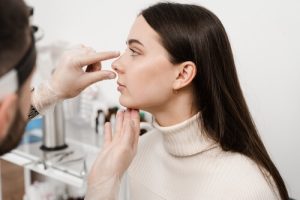Understanding the shape of your nose can be useful in many ways, from choosing the right eyeglasses to deciding on the appropriate makeup application. However, determining your nose shape might be more challenging than it sounds. Our noses come in various forms and sizes, and identifying yours can only be easy with some knowledge and guidance. So you may ask, ‘What nose shape do I have?’ In this article, we will discuss the different nose shapes and provide you with tips to help determine the type of nose you have.
Nose Shapes
There are several common nose shapes that are identifiable, including straight, wide, narrow, hooked, concave, and convex. These shapes can vary depending on several aspects, such as dimensions, proportion, and curvature. To determine your nose shape effectively, it’s crucial to remember that your nose’s overall shape is a mix of different elements. It’s not only about the tip or the bridge but the combination of both.
Types of Nose Shapes
There are several common nose shapes that individuals may possess. Do you have a fleshy nose, Nubian nose, celestial nose, or upturned nose? Here are some of the most common types of nose shapes:
Straight Nose: This nose has a straight bridge and no pronounced bumps or curves. It is often considered a balanced and proportionate nose shape.
Roman Nose: A Roman nose is characterised by a prominent bridge with a slight curve or bump. This nose shape can give the face a strong and distinguished appearance.

Snub Nose: A snub nose is a small nose with a rounded tip that is turned slightly upwards. This nose shape can give the face a youthful and feminine appearance.
Large Nose: This nose shape is characterised by a broad, tall bridge and a larger overall size. It can be a striking feature on one’s face and can give the person a distinct look.
Hawk Nose: This is a nose shape with a prominent bridge that curves down towards the tip, resembling the beak of a bird of prey. It is a distinctive and striking feature that can give the face a sharp and defined look.
Wide Nose: A wide nose has a broad bridge and large nostrils. It can give the face a strong and powerful appearance.
Bulbous Nose: A bulbous nose has a round, wide tip that resembles a bulb. It can be a less defined and less distinguished nose shape, and it is often associated with a more casual or laid-back appearance.
Overall, there are many different types of nose shapes, and each one can give the face a unique and distinct appearance. By identifying one’s nose shape, individuals can embrace and appreciate their unique features and tailor their style and beauty routines accordingly.
Elements of Nose Shapes
The shape of the nose is an important facial feature that can significantly impact a person’s overall appearance. A well-defined and proportionate nose is often considered an aesthetically pleasing feature, while an asymmetrical or disproportionate nose can be a source of self-consciousness for many people. Understanding the elements of a nose shape can help individuals better identify and appreciate their unique features.
The Nose Bridge
The bridge of the nose is the top part that connects the nose to the forehead. One of the most important elements of the nose shape is the bridge height, which is the distance between the tip of the nose and the brow bone. A higher bridge gives the nose a more prominent appearance, while a lower bridge can make the nose appear flatter. The shape of the bridge can also affect the nose’s overall appearance, with a straight bridge giving the nose a more angular look and a curved bridge giving the nose a softer appearance.
The Nostrils
The nostrils are another key element of the nose shape. The size and shape of the nostrils can vary widely from person to person, with some people possessing wide nostrils and others having more narrow nostrils. The shape of the nostrils can also impact the overall appearance of the nose. Round nostrils can give the nose a more youthful appearance, while tapered nostrils can give the nose a more refined look.
The Nose Tip

The Nose Length
The length of the nose is also a crucial element of the nose shape. The length is measured from the bridge of the nose to the tip. Shorter noses can give the face a more youthful look, while longer noses add a more mature and sophisticated appearance. The proportion of the nose to the rest of the face is also fundamental in nose shape analysis. A nose that is disproportionately large or small compared to the rest of the face can create an overall unbalanced look.
The Nose Symmetry
Finally, the symmetry of the nose is another critical element to consider when analysing a nose shape. A symmetrical nose is often considered an attractive feature, while an asymmetrical nose can give the face an unbalanced look. Some people have a natural symmetry to their noses, while others may require cosmetic procedures to achieve a more balanced and symmetrical appearance.
One way to identify the shape of your nose is to stand in front of a mirror and examine your facial features. Analysing the symmetry and proportion of your nose can provide useful insights into the type of nose shape you have. Here are the steps:
- The first thing to consider when studying your nose is the bridge. Is it flat, curved, or straight? The bridge is the top part of your nose and is essential when identifying the shape.
- Another key feature to consider is the length or protrusion of the nose. Is it short or long, and how far does it extend from your face?
- Next, it’s important to examine the tip of the nose. Is it rounded or pointed? Does it slope downwards or turn upwards? The shape and direction of the tip can help you distinguish between different nose shapes, such as upturned or downturned noses.
- Similarly, the nostrils can provide important information regarding the shape of your nose. Are they round or oval in form, and are they wide or narrow?
Overall, determining your nose shape can be a challenging task. Still, by paying close attention to different elements and features, you can successfully identify and understand the type of nose you have. Once you know your nose shape, you can adjust makeup or choose accessories to complement your unique features.
Going online to know your perfect nose shape
If you’re still struggling to determine your nose shape, many online resources can help you. Several nose shape quizzes and guides are available that walk you through the process of identifying your nose shape. These resources can be especially helpful for those who need help analysing facial features or are unsure of what to look for.
Importance of seeking the help of a certified doctor
While there are many resources available that can assist in determining nose shape, seeking the help of a certified doctor is crucial for an accurate and comprehensive analysis. Here are some reasons why it is important to consult with a doctor when identifying your nose shape and deciding if you need a nose job.

Doctors can also provide a more personalised analysis by taking into account other facial features that may impact the nose’s appearance. For example, they may consider the shape of the jawline, the position of the cheekbones, and the overall symmetry of the face when determining the ideal nose shape for an individual.
In addition, seeking the help of a doctor can be important for individuals who are considering cosmetic nose surgery or rhinoplasty. A doctor can evaluate an individual’s nose shape and provide recommendations for surgery that will be based on their individual facial features, goals, and preferences.
Finally, it is important to note that identifying and appreciating one’s nose shape is not simply a matter of aesthetics. Certain nose shapes may be associated with medical conditions such as deviated septums or chronic sinus issues. Consulting with a doctor can ensure that any underlying medical problems are identified and addressed.
Conclusion
In conclusion, knowing your nose shape can be beneficial in many ways, from selecting the right eyeglasses to determining the appropriate makeup application. Identifying nose shape involves considering various facial features such as nostrils, bridge, tip, and body. Examining these features and their combination can help you distinguish between the different nose shapes. Lastly, many online resources offer support and guidance to help you further identify your nose shape.
References:
https://www.cosmopolitan.com/style-beauty/beauty/a8277930/different-nose-shapes/
https://raadinahealth.com/en/blog/types-of-nose-shapes
https://zwivel.com/sniffing-nose-shapes-12-common-nose-types/
https://www.everydayhealth.com/ear-nose-throat-pictures/11-odd-facts-about-your-nose.aspx


Recent Comments